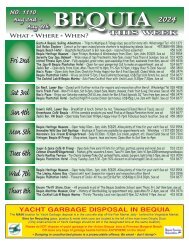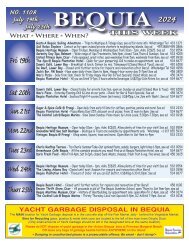Caribbean Compass Yachting Magazine - February 2021
Welcome to Caribbean Compass, the most widely-read boating publication in the Caribbean! THE MOST NEWS YOU CAN USE - feature articles on cruising destinations, regattas, environment, events...
Welcome to Caribbean Compass, the most widely-read boating publication in the Caribbean! THE MOST NEWS YOU CAN USE - feature articles on cruising destinations, regattas, environment, events...
You also want an ePaper? Increase the reach of your titles
YUMPU automatically turns print PDFs into web optimized ePapers that Google loves.
FEBRUARY <strong>2021</strong> CARIBBEAN COMPASS PAGE 8<br />
<strong>Caribbean</strong><br />
ECO-News<br />
<strong>Caribbean</strong> coral reefs mapped<br />
The Nature Conservancy has published the first-ever<br />
detailed maps of all <strong>Caribbean</strong> coral reefs. Highresolution<br />
maps of the underwater habitats of the<br />
entire <strong>Caribbean</strong> have the potential to transform<br />
marine conservation and significantly enhance our<br />
knowledge of the ocean. These revolutionary maps will<br />
STEVE SCHILL FOR TNC<br />
TNC AND ARIZONA STATE UNIVERSITY<br />
livelihoods and prioritize their adaptation to potential<br />
climate change impacts,” said Dr. Robert Brumbaugh,<br />
Executive Director of The Nature Conservancy’s<br />
<strong>Caribbean</strong> Division. “Understanding and protecting<br />
natural resources is critical to the economic success of<br />
these countries.”<br />
Roughly half of all livelihoods in <strong>Caribbean</strong><br />
communities depend on healthy nearshore and coastal<br />
habitats. These maps are intended to inform a diverse<br />
array of conservation and policy decisions to protect<br />
and restore these essential coastal areas that people<br />
depend on. Decision-makers across the region can<br />
now use these new maps to identify areas optimal for<br />
coral restoration activities, guide climate change<br />
adaptation, and identify the best locations for<br />
establishing marine protected areas that successfully<br />
balance protection and diverse uses.<br />
The finalized maps are now available at<br />
<strong>Caribbean</strong>MarineMaps.tnc.org.<br />
Dangerous levels of heavy metals in sharks<br />
A new study found alarmingly large levels of 12<br />
heavy metals, including mercury, in the muscle<br />
tissues of reef and tiger sharks sampled throughout<br />
the Bahamas. These findings carry important<br />
implications for human health in the Greater <strong>Caribbean</strong><br />
Region, where people consume shark.<br />
Sharks are apex predators. They naturally<br />
bioaccumulate toxins in their bodies from eating other<br />
Top left: An aerial drone is launched to gather habitat<br />
imagery off the coast of St. Croix, USVI.<br />
Above: An aerial drone is used to gather habitat<br />
imagery in Soufriere-Scott's Head Marine Reserve<br />
in Dominica.<br />
Left: Airborne imagery map revealing habitat<br />
complexity at Bávaro, Dominican Republic, site.<br />
STEVE SCHILL FOR TNC<br />
that they may have found an ally capable of turning<br />
the tide on coral reef decay: <strong>Caribbean</strong> King Crabs.<br />
As a coral reef’s health diminishes, rampant<br />
amounts of seaweed invade the space where the coral<br />
once thrived, making it even more difficult for corals<br />
to bounce back. Now, however, researchers report<br />
that they have come up with a potential solution that<br />
relies heavily on the seaweed-heavy diet of one<br />
special crustacean.<br />
In a study published in the journal Current Biology,<br />
researchers reveal that after decades of studying coral<br />
reef habitats, one of their strongest natural tools in<br />
reversing coral reef decline rested with the <strong>Caribbean</strong><br />
King Crab. These largely nocturnal creatures can<br />
consume massive amounts of seaweed on a regular<br />
basis, capable of eating at rates that can rival almost<br />
any other <strong>Caribbean</strong> marine species. They also tend to<br />
eat types of seaweed that other underwater dwellers<br />
avoid, making them ideal candidates to remove<br />
unwanted amounts of underwater vegetation.<br />
Despite <strong>Caribbean</strong> King Crabs being so well suited to<br />
the task, however, researchers determined that there<br />
are simply not enough of them naturally occurring<br />
around coral reef areas to help keep seaweed growth<br />
under control. This led the researchers to wonder just<br />
how much a difference crabs could make on the health<br />
of the environment if they introduced a host of new<br />
<strong>Caribbean</strong> King Crabs to a coral reef ecosystem.<br />
Mark Butler of Florida International University said<br />
that after researchers put this idea to the test using<br />
coral reefs off the Florida Keys, the results were<br />
nothing short of impressive.<br />
“Experimentally increasing the abundance of large<br />
native, herbivorous crabs on coral reefs in the Florida<br />
Keys led to rapid declines in seaweed cover and, over<br />
the course of a year or so, resulted in the return of<br />
small corals and fishes to those reefs,” Butler said with<br />
the release of the study. “This opens up a whole new<br />
avenue for coral reef restoration.”<br />
Researchers made the discovery by conducting<br />
experiments in 12 isolated sections of a coral reef, with<br />
each of the sections falling into one of three distinctive<br />
groups: coral reef sections that were stocked with<br />
fresh crab, sections that were stocked with fresh crab<br />
after divers scrubbed as much algae and seaweed from<br />
the coral reefs as they could, and sections that were<br />
left completely untouched.<br />
After waiting roughly a year to see how the coral<br />
reefs accepted these changes, the results clearly<br />
showed just how much good the <strong>Caribbean</strong> King Crabs<br />
were doing. While the coral reef sections that scientists<br />
didn’t touch saw no change in their seaweed coverage,<br />
the sections that were stocked with crab saw seaweed<br />
coverage drop to nearly 50 percent, while the sections<br />
divers scrubbed first dropped by nearly 80 percent.<br />
These results were so definitive and startling that<br />
researchers insisted on replicating the experiment in a<br />
different location to ensure they were onto something<br />
— a second experiment that yielded virtually the exact<br />
same outcome.<br />
The study reports that establishing new coral reef<br />
nurseries to raise <strong>Caribbean</strong> King Crabs is going to be<br />
a crucial step moving forward, one that researchers<br />
help guide the sustainable use and protection of<br />
marine resources for island nations in which 60<br />
percent of living coral has been lost in the past few<br />
decades alone.<br />
These maps were created by stitching together tens<br />
of thousands of high-resolution satellite images, and<br />
in some places using aerial fly-over technology, drones,<br />
and divers to validate the data. By utilizing data<br />
captured from outer space to undersea, scientists were<br />
able to map and more accurately interpret the coastal<br />
ecosystems throughout the <strong>Caribbean</strong>. Having<br />
accurate and complete underwater habitat data for<br />
this region means that there is now cutting-edge<br />
guidance available to inform the sustainable use of<br />
marine resources on which 44 million <strong>Caribbean</strong><br />
residents depend.<br />
“You cannot protect what you don’t know is there.<br />
Having access to these maps is a game-changing<br />
achievement for the <strong>Caribbean</strong>. Thirty countries and<br />
territories finally have access to better, more detailed<br />
information about their underwater habitats to help<br />
them better protect marine areas, support sustainable<br />
species of fish. The impacts of heavy metals on shark<br />
health remain unknown. However, the concentrations<br />
of metals present in the study exceed levels considered<br />
toxic for human consumption. The study also finds<br />
that reef sharks, the more resident species, have<br />
higher mercury levels than tiger sharks.<br />
The human health risks of ingesting heavy metals<br />
include muscular, physical and neurological<br />
degenerative processes that are similar to diseases<br />
such as Parkinson’s disease, multiple sclerosis,<br />
muscular dystrophy and Alzheimer’s disease.<br />
Symptoms of mercury poisoning in particular may<br />
include muscle weakness, poor coordination, numbness<br />
in the hands and feet, skin rashes, anxiety, memory<br />
problems, trouble speaking, trouble hearing, or trouble<br />
seeing. Since there is a risk to the fetus in particular,<br />
pregnant women are advised to avoid eating shark.<br />
Dr. Oliver Shipley, the study’s lead author, is a<br />
Research Associate at Beneath the Waves and<br />
postdoctoral researcher at The University of New Mexico.<br />
Visit www.nature.com/articles/s41598-020-79973-w<br />
to download an open-access PDF of the full<br />
research paper.<br />
Seaweed-munching crabs may help save corals<br />
While the health of coral reefs around the world has<br />
been on the decline for decades, new research suggests<br />
<strong>Caribbean</strong> king crabs consume the seaweed that<br />
chokes coral reefs.<br />
are currently pursuing. Researchers note, however,<br />
that while the study shows just how effective crabs<br />
can be at repairing coral reefs, sweeping conservation<br />
efforts are still needed.<br />
“Conquering the challenge of climate change coupled<br />
with local reef restoration, like development of stocking<br />
programs for herbivorous crabs, are immediately<br />
necessary to reverse this decline,” Butler said. “Our<br />
findings mean little if they don’t result in tangible new<br />
restoration efforts.”<br />
Read the full story at www.courthousenews.com/<br />
seaweed-munching-crabs-may-help-save-coral-reefs.<br />
Carriacou’s e-Concrete project update<br />
Richard Laflamme, Founder of Carriacou’s Zero Plastic<br />
Waste Project, and Ingrid Lewis, Project Manager, report:<br />
Our concrete blocks containing ten percent granulated<br />
waste plastic were tested by the Grenada Bureau of<br />
Standards and confirmed to have a compressive strength<br />
in excess of 150 percent over specification.<br />
The next step is to up-scale this project to a sustainable<br />
business with the full support of the Grenada Solid Waste<br />
Management Authority and local hollow block builders.<br />
—Continued on next page

















